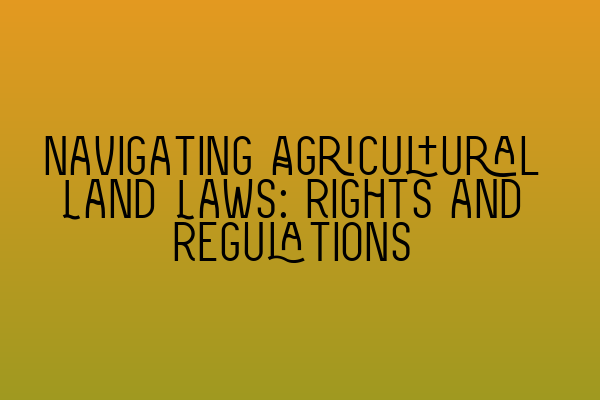Navigating Agricultural Land Laws: Rights and Regulations
As a property owner or farmer, understanding the rights and regulations surrounding agricultural land is crucial to ensure compliance and protect your interests. The laws governing agriculture are complex and varied, but with the right knowledge and guidance, you can navigate them successfully. In this blog post, we will explore some of the key aspects of agricultural land laws and provide important insights for farmers, landowners, and anyone interested in this field.
1. Ownership Rights and Restrictions
Ownership of agricultural land comes with specific rights and restrictions. It is essential to understand the legal framework that governs ownership in order to protect your interests. Land tenure systems, such as freehold, leasehold, and sharecropping, may apply to agricultural land, and each carries its own set of rights and responsibilities.
For a comprehensive understanding of ownership rights and restrictions, it is advisable to consult with a property law solicitor who specializes in agricultural land. They can offer expert advice tailored to your specific circumstances. To find more information about property law solicitors, visit our website [insert link to your website].
2. Environmental Regulations
In recent years, there has been an increased focus on environmental regulations, particularly in the agricultural sector. Farmers are now subject to a wide range of laws aimed at protecting the environment and promoting sustainable farming practices.
These regulations cover various aspects such as water management, waste disposal, pesticide use, and the protection of wildlife habitats. Compliance with these regulations is not only a legal requirement but also essential for the long-term sustainability of your farm.
To stay up to date with the latest environmental regulations and best practices, consider attending specialized training courses. [Insert link to your SQE 2 Preparation Courses article] These courses are designed specifically to help farmers understand and navigate the complex web of environmental regulations.
3. Planning and Development
Agricultural landowners often face challenges when it comes to planning and development. Local planning authorities have the power to grant or deny planning permission for activities on agricultural land, including changes of land use or construction of buildings.
Navigating the planning permission process can be complex and time-consuming. It is important to seek legal advice to ensure compliance with planning regulations and maximize the chances of a successful planning application. [Insert link to your SQE 1 Preparation Courses article] SQE 1 Preparation Courses provide the necessary knowledge and skills to tackle property-related legal matters effectively.
4. Agricultural Tenancy Laws
Agricultural tenancy laws govern the relationship between landowners and tenants. The rights and responsibilities of both parties are enshrined in law to ensure fair treatment and protect the interests of both parties. If you are considering renting out agricultural land or becoming a tenant, it is essential to understand the legal obligations associated with agricultural tenancies.
Consulting with a solicitor who specializes in agricultural tenancy laws can help clarify your rights and responsibilities as a landowner or tenant. They can guide you through the process of drafting, negotiating, and renewing tenancy agreements. For further information about agricultural tenancies, click here [insert link to your SQE 1 Practice Exam Questions article].
5. Succession Planning
Succession planning is another critical consideration for agricultural landowners. Planning for the future transfer of your land ensures its continued cultivation and protection. Succession planning can help mitigate disputes and provide clarity for future generations.
Consulting with a specialist solicitor who is well-versed in agricultural land succession planning can help you navigate the legal complexities involved. They can assist in drafting wills, trusts, and other legal documents that ensure a smooth transition of ownership.
To stay up to date with the latest developments in agricultural land laws and regulations, regularly visit the SRA SQE Exam Dates page on our website [insert link to your SRA SQE Exam Dates article]. This will provide you with relevant information about upcoming examinations and continuing professional development (CPD) opportunities.
Navigating agricultural land laws can be complex, but with the right support and guidance, you can protect your interests and comply with regulations. By working with a specialist property law solicitor and staying informed about the latest developments, you can ensure the long-term success of your agricultural endeavors.
Remember, the information provided above is for general purposes only and does not constitute legal advice. It is advisable to consult a legal professional for specific guidance tailored to your circumstances.
